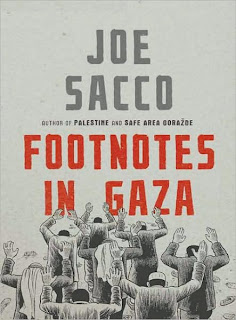 Joe Sacco would be the world's premiere investigative cartoonist even if the world had a hundred of them. It doesn't, of course -- Sacco is probably the only one working that beat regularly -- but his devotion both to the craft of cartooning and the journalistic virtues of getting out and getting the story right set him at the head of his field, no matter how large it is.
Joe Sacco would be the world's premiere investigative cartoonist even if the world had a hundred of them. It doesn't, of course -- Sacco is probably the only one working that beat regularly -- but his devotion both to the craft of cartooning and the journalistic virtues of getting out and getting the story right set him at the head of his field, no matter how large it is.(Because it's true, though often remarked, that someone can be the only person in the world doing something, and still not do it very well -- like Johnson's comment about the bear walking on its hind legs -- it's worth noting that Sacco combines two difficult disciplines by doing both of them well.)
Footnotes in Gaza may seem like a return to the subject matter of Sacco's earlier book Palestine; I'm sure that people with a vested interest in the politics of several countries in the Middle East will consider it primarily in that light. But it really is an entirely separate investigation -- and, as usual with Sacco, he wants to know about the details, not the big picture. In this case, those details concern two incidents in which Israeli soldiers reportedly killed civilians in Gaza during the 1956 Suez war, and Sacco devotes as much of this long book to detailing how he went about researching those incidents (which required getting into Gaza, a very difficult undertaking for anyone, tracking down eyewitnesses, getting them to stay on topic rather than complaining about Israel in general, and cross-checking all the stories he could find against each other) as he does in reconstructing those incidents as best he can. The truth of what happened in the towns of Khan Younis and Rafah -- as well as Sacco could reconstruct it, given the passage of nearly fifty years when he came to Gaza in 2002 -- comes out by the end of Footnotes, and it's the old, old story of troops behaving badly (for reasons Sacco mostly isn't interested in; he's researching what happened, not why) among civilian populations in a combat zone.
This will inevitably be seen as a pro-Palestinian book, as Palestine was; any substantial work reported from the lives of a people under occupation, if at all even-handed or honest, will create sympathy for the occupied (and probably at least a mild dislike for the occupiers). And one could definitely argue that Sacco should have balanced his inquiries into these "massacres" with equal time for the attacks of the Egyptian fedayeen on Israel at around the same time -- and one fedayee is very important early in Footnotes, providing a lot of background to the Khan Younis incident -- but that's not the book Sacco wanted to write. (On the one hand, one might read bias into choices like that. On the other, any work must have a limited scope to have any hope of being successful. There's always room to argue for or against bias, and what we finally decide is probably as much a reflection of our intrinsic biases as it is based on Sacco's work.)
Sacco is sympathetic to the people he meets and works among and interviews; no reporter worth reading could be otherwise. But he does judge their stories honestly -- as far as I could tell -- and provides detailed appendices covering the official documents on these incidents as well as plenty of balance within the body of the comic itself. In the end, it's clear that the citizens of the Gaza Strip are currently downtrodden, and live under horrible conditions. And a hundred or so of their brothers, fathers, and uncles were killed, for no reason, by invading Israeli troops in '56. Many of them may also support -- monetarily, or through acts of omission or commission -- the destruction of Israel and the murder of its citizens. (And there's a lot of history, on both sides, between '56 and '02, which can explain -- though not necessarily justify -- what has happened and keeps happening, on both sides.) That doesn't make any of it right, but it does make everything horribly complicated. At least there's Joe Sacco, once again willing to dive headfirst into a dangerous part of the world and to attempt to make sense of it for those of us on the outside. As long as there are reporters like him -- willing and able to do the tough work to dig out as much of the truth as they can find -- there's still hope for all of us.
Book-A-Day 2010: The Epic Index
No comments:
Post a Comment